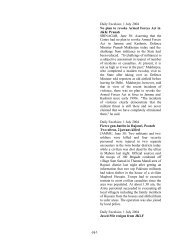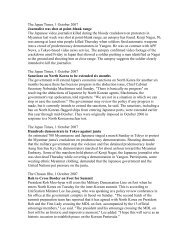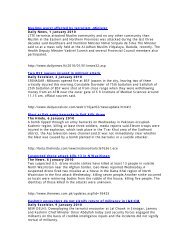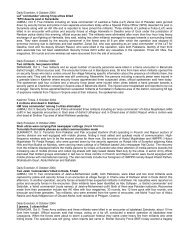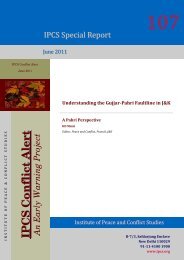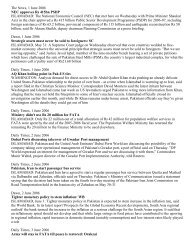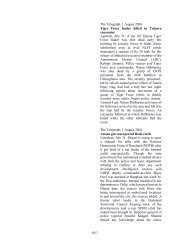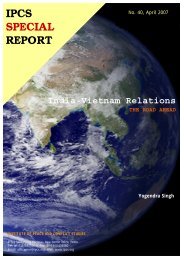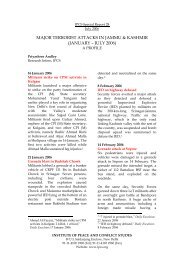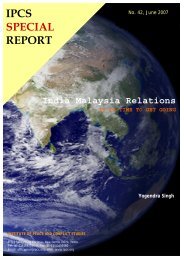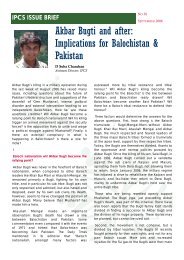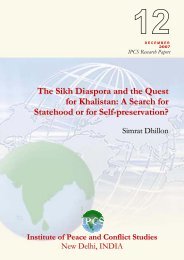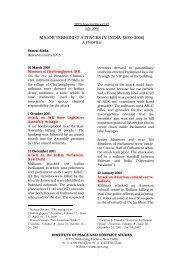April-June 2013 - Institute of Peace and Conflict Studies
April-June 2013 - Institute of Peace and Conflict Studies
April-June 2013 - Institute of Peace and Conflict Studies
You also want an ePaper? Increase the reach of your titles
YUMPU automatically turns print PDFs into web optimized ePapers that Google loves.
international border villages. Most <strong>of</strong> the scholars who worked<br />
on border villages, focused mainly on nationalism, transgression,<br />
<strong>and</strong> trans-cultural realities; but, borders which exclusively<br />
remain rigid <strong>and</strong> impermeable, have been least studied.<br />
If we look at the economic interests <strong>of</strong> the region, they do not<br />
want borders to open up. However, bitter memories <strong>of</strong> the<br />
partition that led to the division <strong>of</strong> hundreds <strong>of</strong> families, have led<br />
them to formally propose the opening up <strong>of</strong> the Turtuk-Khapulu<br />
route. Even the people settled along the border, are themselves<br />
ambiguous on the issue.<br />
Tashi Lundup, Ph.D. Scholar at JNU; from Sham (Leh)<br />
To underst<strong>and</strong> various issues regarding tourism <strong>and</strong> culture in<br />
the context <strong>of</strong> Ladakh, the focus has to be maintained on three<br />
main points. Firstly, a brief historical background <strong>of</strong> the<br />
development <strong>of</strong> tourism in Ladakh needs to be understood.<br />
Secondly, an underst<strong>and</strong>ing <strong>of</strong> authenticity <strong>and</strong> commodification<br />
<strong>of</strong> culture in general, <strong>and</strong> religion in particular, needs to be<br />
developed. Finally, tourism <strong>and</strong> its impact on society must be<br />
analysed.<br />
Tourism has brought positive developments in the region;<br />
however, it has also simultaneously contributed in projecting the<br />
image <strong>of</strong> Ladakh as only being a much sought after tourist<br />
destination. This has consequently resulted in overshadowing<br />
the day to day issues affecting the Ladakhi people.<br />
Resource Person: Kavita Suri, Assistant Pr<strong>of</strong>essor, Centre for<br />
Adult, Continuing Education & Extension, Jammu University<br />
People who visit Ladakh write about their experiences in the<br />
region on blogs, pr<strong>of</strong>essional <strong>and</strong> personal websites. The region<br />
is also being publicised through social networking sites, print<br />
media, television etc. However, it is difficult to run a newspaper<br />
even in a place like Ladakh, despite it having a limited<br />
population, <strong>and</strong> the fact that everyone knows each other.<br />
There are not enough internet facilities, <strong>and</strong> one faces lots <strong>of</strong><br />
problems in the process <strong>of</strong> circulating newspapers. In Turtuk,<br />
people have bitter memories <strong>of</strong> partition, <strong>and</strong> the locals claim to<br />
have more divided families across the border as compared to<br />
Kargil. According to them, each family has relatives across, <strong>and</strong><br />
they have been dem<strong>and</strong>ing the reopening <strong>of</strong> Khapulu Road,<br />
which is just 200km from Turtuk. They have also been<br />
dem<strong>and</strong>ing the opening <strong>of</strong> a road from Turtuk to Kargil, which<br />
falls under India. The Indian Government should consider its<br />
opening for the benefit <strong>of</strong> this isolated region.<br />
Report Review<br />
India, Pakistan - Propelling Indus Water 'Terrorism' (IWT)<br />
Roomana Hukil<br />
Research Officer, IReS, IPCS<br />
Connecting the Drops: An Indus Basin Roadmap for Cross-<br />
Border Water Research, Data Sharing, Policy Coordination<br />
Indus Basin Working Group<br />
Stimson Center, SDPI, ORF<br />
26 February <strong>2013</strong><br />
The 67-page report is a well-documented analysis <strong>of</strong> the<br />
emerging challenges pertaining to the Indus Water Basin.<br />
Among the several recommendations highlighted in the<br />
report, the immediate focus is to prioritise investments <strong>and</strong><br />
institutionalise regular upkeep <strong>of</strong> the canal infrastructure. The<br />
report laid significant emphasis on developing a digitalised<br />
online system <strong>of</strong> the Indus Basin to foster developing a<br />
regional network <strong>and</strong> intensified hydrological modelling<br />
capacities. Further prominence was laid on the need to<br />
conduct a joint research study evaluating the cumulative<br />
environmental impact <strong>of</strong> multiple dam constructions on an<br />
individual watercourse, <strong>and</strong> develop the technical know-how<br />
on the relationship between dam cascades, river basin<br />
hydrology, <strong>and</strong> climate change. It also impressed on the need<br />
to increase the knowledge base on monsoon variability trends<br />
to improve outcomes for rainfall-dependent agriculture,<br />
along with the use <strong>of</strong> multi-media tools to raise public<br />
awareness <strong>of</strong> climate change within India <strong>and</strong> Pakistan.<br />
Typifying the treaty itself, it also depends on the inflows <strong>of</strong> the<br />
Indus Water Basin, which in a larger perspective, affects<br />
climate change that further affects the river system.<br />
The report blames the lax implementation by India <strong>and</strong><br />
Pakistan for its ineffectiveness stating that "both the countries<br />
are lax in their implementation (<strong>of</strong> the Indus Water Treaty).<br />
However, it fails to garner political laxity vis-à-vis its technical<br />
responses, <strong>and</strong> hinders to <strong>of</strong>fer substantial politico remedies<br />
in adhering to the treaty. It also does not provide ground<br />
artefacts that should bind both the actors in times <strong>of</strong><br />
observing strict adherence to the treaty. Alternately, the<br />
report should have featured the need for a change in the<br />
mind-sets <strong>of</strong> those who govern the management <strong>of</strong> the<br />
watercourse between both countries. Since the cryosphere<br />
(snow <strong>and</strong> glaciers) <strong>of</strong> the upper Indus Water Basin is rapidly<br />
altering, amounting to a rise in the surface air temperatures<br />
by 1.80 degrees celsius over the past five decades, this is<br />
doubling the global average temperature <strong>of</strong> the region.<br />
Underst<strong>and</strong>ing the dichotomy <strong>of</strong> the region, in terms <strong>of</strong> a<br />
change in the geo-strategic structures, urges for an imperative<br />
need which was found missing in the report. As warming<br />
temperatures <strong>and</strong> changing solid precipitation patterns are<br />
altering the duration, timing, <strong>and</strong> extent <strong>of</strong> seasonal snowcovered<br />
areas, measures to encapsulate a dialogue <strong>of</strong> trust<br />
between India <strong>and</strong> Pakistan are the need <strong>of</strong> the hour.<br />
Although the report did signify an institutionalised modest<br />
exchange <strong>of</strong> hydrological data between both countries for<br />
future exchanges <strong>of</strong> water supplies, <strong>and</strong>, more so, “to mitigate<br />
Pakistan's legitimate sensitivities”, it failed to reduce the<br />
trust-deficit between both the countries. It is <strong>of</strong> critical<br />
South Asia Plus 37



